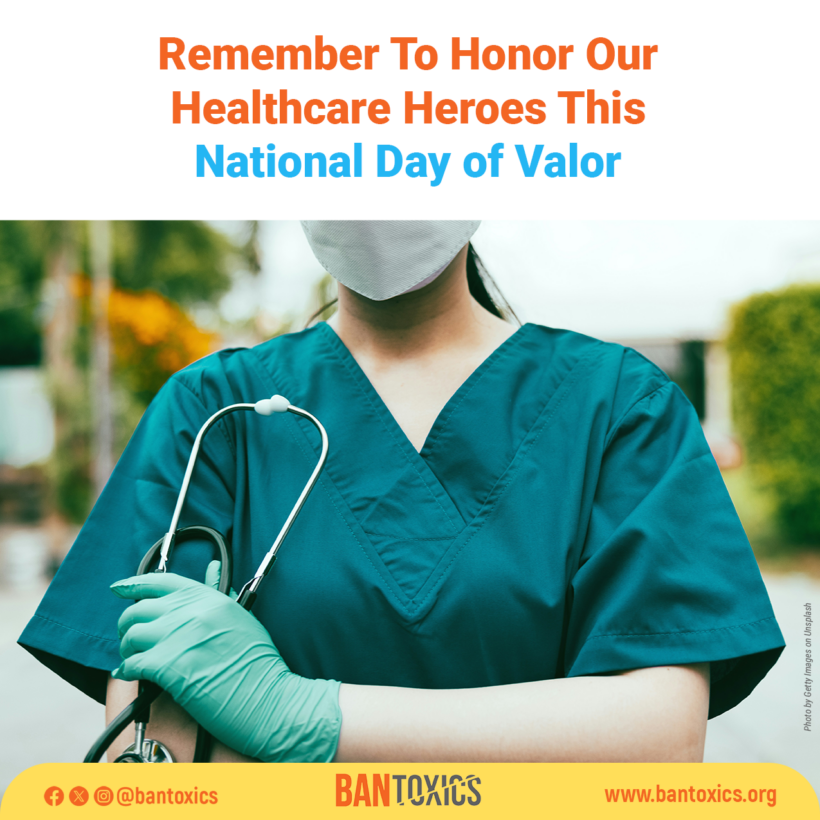Multi-year Healthcare Waste Management Project Launched
Healthcare workers, who bravely put themselves at risk to protect our communities, deserve to be safeguarded. This was BAN Toxics’ message as the country celebrates the Day of Valor.
“As we continue to navigate the post-COVID-19 landscape, let us not forget the sacrifices of our healthcare workers who were at the frontlines of the past global pandemic. They remain our heroes who risk their lives to provide us with essential care and support. It is important that we recognize their plight and ensure their well-being is prioritized as we face the challenges ahead,” Thony Dizon, BAN Toxics Campaign and Advocacy Officer, said.
According to Dizon, one of the healthcare issues that BAN Toxics plans to address in the coming years is the improvement of Personal Protective Equipment (PPE) utilized by the health sector. Commonly used in medical settings for protection from infectious diseases and to block the transmission of contaminants, PPEs are among the crucial preventive strategies employed during the pandemic. However, while PPE serves as protection, COVID-19 revealed that it is also a source of massive solid waste and toxic pollution.
Considered one of the most efficient and affordable ways to protect healthcare workers to contain the transmission of the virus, the use of single-use PPE, such as medical masks, gloves, gowns, face shields, and goggles during the pandemic has likewise increased the amount of plastic waste due to mismanagement and improper disposal.
Seen as ‘commodity products’, most types of PPEs are designed for single use with limited need for innovation by manufacturers and consumers. But disposable PPE contains different plastics, including polypropylene and polyethylene (for masks and gowns), polyvinyl chloride, nitrile, and latex (gloves).
The majority of PPE used by consumers either ends up in landfills and dumpsites or is thrown into the environment, adding strain to already overwhelmed waste management systems. PPE is commonly disposed of through on-site incineration resulting in the release of harmful pollutants, such as dioxins and furans. When organisms ingest contaminated food sources, these persistent organic pollutants can accumulate in their bodies, ultimately posing threats to human health when consumed,” according to the group.
To address these healthcare waste management issues, BAN Toxics is working with the Department of Natural Resources – Environmental Management Bureau (DENR-EMB) and the United Nations Industrial Development Organization (UNIDO) for the Philippine Healthcare and Mercury Wastes Management Project (PHCHgWMP). Officially launched in December last year, the PHCHgWMP is a five-year project of UNIDO funded by the Global Environment Facility (GEF), with the DENR-EMB as the national implementing agency, and BAN Toxics as the implementing partner.
“Under the PHCHgWMP, we plan to assess the lifecycle impact of PPE and work with small manufacturers, women-led enterprises, and communities to improve the production of reusable PPEs based on WHO guidelines. Technical assistance will be provided to Treatment, Storage, and Disposal (TSD) facilities through green financing schemes. Moreover, there will be awareness raising on the management and training on PPE disposal, and the implementation of the best available techniques and best environmental practices for the treatment of healthcare wastes,” Dizon ended.
References:
https://www.facebook.com/photo/?fbid=846818490818216&set=pb.100064702179348.-2207520000










